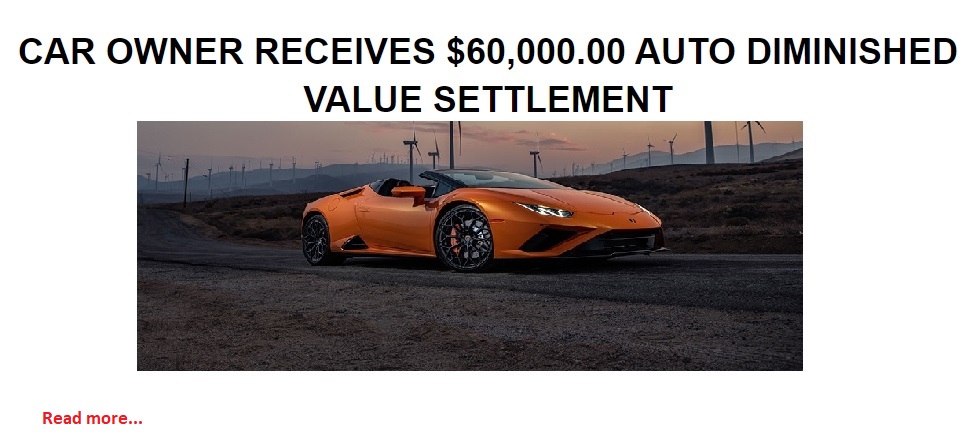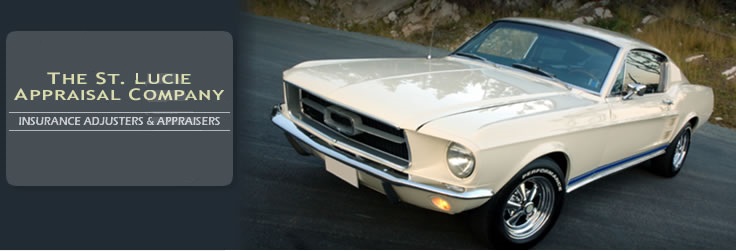What is diminished value? This newly coined term is most often applied to the reduction in value of a car or truck after collision damages have been repaired. Regardless of how well the repairs were done, used car buyers would rather purchase an automobile with no accident history, thereby making the previously repaired vehicle worth less than its counterpart. The St. Lucie Appraisal Company prepares automobile diminished value reports in all 50 states and, in our experience, we’ve learned that there are wildly varying opinions about what fair compensation consists of. With the advent of vehicle history reports such as Carfax and Autocheck, it is now possible for us to view almost everything that has taken place during a car’s lifetime. The definition of diminished value has taken on an even great significance since car owners began filing diminished value claims against the insurance companies of at-fault drivers. These are known as third-party claims. Insurers are obligated to consider payment of these claims under the property damage portion of their insured’s policy which states that they must restore the victim’s car to its pre-accident value. This includes not only making sure that adequate compensation is provided for quality repairs, it also covers the inherent diminished value that is part and parcel of the car now having a “bad Carfax.” It is seldom an easy task to obtain a fair settlement from insurance companies but our job is to help our clients navigate these treacherous waters. Diminished Value is a relatively recent development in the world of insurance claims so, as far as the State Farms, Geicos, Allstates and Farmers of the world, the less you know about it, the better. It is what we are doing at St. Lucie Appraisal – defining diminished value.
SIX UNBIASED DEALER QUOTES IN EVERY APPRAISAL TO VALIDATE OUR RESEARCH
TELEPHONE CONSULTATIONS ALWAYS FREE-OF-CHARGE
From Wikipedia: While some may claim Diminished Value is subjective and based upon perception or speculation, the old adage “perception becomes reality’ applies and as such Diminution in Value is real simply because, for the most part, no reasonable and prudent person is willing to pay the same price for a vehicle with a history of damages as they would for one never having been damaged. It is therefore reasonable that the value of a damaged motor vehicle will suffer a lessening in value. How much of a vehicle’s value is ultimately lost after repairs are completed? The amount of diminished value varies according to many factors. The year, make, model, mileage, type and severity of repaired damage and even a car’s color can factor in to the equation. Consumers of high-end cars such as Tesla, Mercedes-Benz and Porsche tend to be more discriminating and usually won’t buy a vehicle that was repaired, regardless of how minor the damage was. Diminished Value can result in 50% of the vehicle’s value lost, especially if frame damage or air bag deployment was involved.

Now for the important part of the article – determining how much of your car’s value has been lost as a result of its having been repaired. As you have read, the year, make, model and severity of damage all play a part but the question remains – what methodology best answers the question most definitively? Here are the most commonly used approaches that are used by independent appraisal companies.
- A letter from the claimant’s dealership declaring that the vehicle has lost value as a result of undergoing collision repairs. A typical insurance company response: “A dealership is not a disinterested third party and has a financial interest in the acquisition price of a trade in vehicle. Their business model is to buy low and sell high. An offer of trade is simply the starting point of a negotiation and does not, in and of itself, establish any specific loss in value. It is our position that the documentation presented by you does not provide any underlying market data in support of the post-accident value of your vehicle.” One may concede that the use of a trade-in quote from the claimant’s dealer presents a valid argument that this is not an acceptable method.
- Figures made up out of thin air, usually buttressed by an appraiser’s assertion that they are based on his or her years of experience in the field.
- By using formulas or algorithms such as Rule 17-C which assigns modifiers (points) to things such as whether frame/unibody damage or air bag deployment occurred or whether adjacent panels needed to be painted. These types of reports are subjective, simplistic and abstract. In our experience, judges and juries who have attempted to decipher this type of appraisal couldn’t understand them even after having them explained by insurance company attorneys who themselves had difficulty understanding them.
- The use of automobile auction results, while proving a better method that the formulaic approach, have been deemed too generic by insurers. These results will show a number of similar vehicles that were sold at auction, some that were never damaged and others with bad Carfaxes. You can see that the bad Carfax vehicles sold for less but the auction printouts don’t show the mileage, options, colors, etc. of each vehicle nor do they list the extent of the damages that were repaired. Insurance companies will argue that these results do not apply to your car and the circumstances of the case being heard – your vehicle and the damages that were repaired.
- A deduction based on the difference between NADA Retail and Trade-In Values.
- Improper use of Carfax.com retail ads. An appraisal showing random screen shots of similar cars for sale, some of which were previously repaired, to make comparisons. Typically, very little information about the cars such as mileage, condition, how much was paid for the car and, most importantly, a description of the repairs that were done is provided. This method also invites “cherry-picking” of higher and lower-priced cars.
- A diminished value report that is prepared by The St. Lucie Appraisal Company takes into consideration all of the specifics of your car as well as the exact amount and nature of the damages that were repaired. It is as comprehensive a diminished value report as you can find. Our report contains our own expert opinion. Largely based on the average of the professional opinions of six sales managers at recognized dealerships in your area, our research is thorough and a represents the most valid methodology available. The last paragraph of our report addresses insurance company concerns regarding the use of dealer quotes. It reads: “All of the dealers queried were informed that the subject vehicle was not available for purchase or trade, therefore none of the dealers queried had any vested interest in the subject vehicle. This method represents unbiased, irrefutable proof of the evidence and approximate amount of inherent diminished value.
Do not be surprised if insurance companies offer you only a few hundred dollars in compensation for diminished value. Some even have the temerity to offer nothing at all. A recent case in which we provided expert testimony resulted in Safeco Insurance Company, who had, in fact, offered absolutely nothing to our client, having to pay the full diminished value amount, our appraisal fee, our expert witness fee and our client’s attorney’s fee. On top of what Safeco had to pay its own experts and legal defense team, it was a hard lesson learned by the insurer. As more and more magistrates and mediators become familiar with diminished value, claimant’s will eventually have an easier time obtaining fair settlements. For our part, all we can do is provide the fairest, most comprehensive and easy to understand diminished value appraisals in the business. Even if it takes a little longer.
![]()
Click on the payment button above to pay by Credit Card or Paypal. The fee for an Automobile Diminished Value Report is
$275.00. You may also make your Credit Card Payment by telephone, call 772-359-4300.
Service throughout Alabama, Alaska, Arizona, Arkansas, California, Colorado, Connecticut, Delaware, Florida, Georgia, Hawaii, Idaho, Illinois, Indiana, Iowa, Kansas, Kentucky, Louisiana, Maine, Maryland, Massachusetts, Michigan, Minnesota, Mississippi , Missouri, Montana, Nebraska, Nevada, New Hampshire, New Jersey, New Mexico, New York, North Carolina, North Dakota, Ohio, Oklahoma, Oregon, Pennsylvania, Rhode Island, South Carolina, South Dakota, Tennessee, Texas, Utah, Vermont, Virginia, Washington, West Virginia, Wisconsin and Wyoming
READ MORE ARTICLES…


